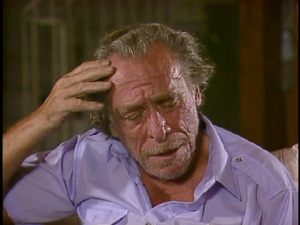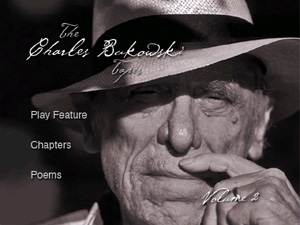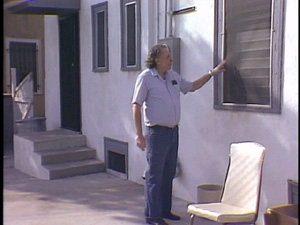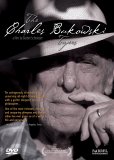| Reviews & Columns |
|
Reviews DVD TV on DVD Blu-ray 4K UHD International DVDs In Theaters Reviews by Studio Video Games Features Collector Series DVDs Easter Egg Database Interviews DVD Talk Radio Feature Articles Columns Anime Talk DVD Savant Horror DVDs The M.O.D. Squad Art House HD Talk Silent DVD
|
DVD Talk Forum |
|
|
| Resources |
|
DVD Price Search Customer Service #'s RCE Info Links |
|
Columns
|
|
|
Charles Bukowski Tapes
THE MOVIE:

"I think all things are more important than truth. If we keep thinking of truth, we're not going to get there."
So says Charles Bukowski a little over a quarter of the way into a four-hour compilation of interviews conducted by Barbet Schroeder (Barfly, Reversal of Fortune). Taped over several years in the early '80s, The Charles Bukowski Tapes is one filmmaker's search for the truth of another man, and by the time the author expresses his disdain for that truth, it's no surprise. Very few subjects can escape the poet's lash.
The ironic subtext of this particular segment of the film is that Schroeder is attempting to capture some kind of truth with his camera. In the end, Bukowski is probably right. If he spent all that time talking about truth as some great pillar of human virtue, he'd come off as an empty blowhard; by talking about everything else, he takes us much closer to what is real. It's not the only irony of The Charles Bukowski Tapes. The greatest switch-up of all is probably the fact that the documentary's subject speaks of his contempt for modern life and his alienation from his fellow man, but at the same time it's impossible not to see how much he enjoys being in front of the lens.
As I noted in my review of Bent Hamer's Factotum, it's somewhat of a fool's errand to try to portray Charles Bukowski in a dramatic movie because he was always so good at portraying himself. Even though Schroeder would eventually try to recreate the cantankerous writer in Barfly, he first wrestled with the subject by just letting the man talk. (Point of fact, The Charles Bukowski Tapes was made almost as pre-production for Barfly.) In essence, the movie camera would replace the paper in the typewriter, and rather than having the writer put his ideas down in ink, Schroeder would try to capture them straight from the old man's mouth. The Charles Bukowski Tapes is cut into fifty-two individual segments. They aren't arranged as a narrative, but more like a book of verse, each numbered segment its own poem.
The frame is always on Bukowski. If it moves off of his craggy, world-weary face, it's to show his lumbering, time-ravaged body. There are moments where Schroeder shakes it up, taking Bukowski back to his childhood home or touring his Hollywood haunts in an open convertible. For the most part, though, it's all on him, and he talks about everything that comes to mind. Topics include drunken escapades, Elizabeth Taylor, how much nature bores him, women, jobs (many of them anecdotes that would show up again in Factotum), James Thurber, and the idea of fame, among many others. He also reads poems and expands upon their themes. The famous alcoholic even tells us why drugs are bad.
In rare instances, real life intrudes, and it proves that Bukowski can be as bad as he portrays himself. In a now infamous scene that was also used in last year's Born Into This, Bukowski gets in an argument with Linda, the woman he is living with. It escalates from verbal abuse to physical abuse, though Schroeder cuts just as it turns really violent, following the lunging mass of the writer with a title card that informs us that Bukowski and Linda eventually married. It's chilling. All the more so later when we see Bukowski pick up a dainty kitten and show it some honest affection. It just seems weird when you consider both scenes.
The Charles Bukowski Tapes will most likely serve as the definitive video document of the author. Schroeder's noninterference means we get the dirty old man straight with nothing to dilute his charge. Four hours may be a little much, however. Bukowski isn't the most animated speaker. There aren't many variations to his body language or vocal delivery, and though Schroeder serves it all up in quick shots, you probably won't be able to down the whole bottle at once. To switch from the drinking metaphor back to the idea that The Charles Bukowski Tapes was put together like a book, the big difference is that a printed volume allows for reader control. You can turn the page at your own choosing or linger longer on a particular piece if you so desire. That's not as easy with a DVD, and the slowness of the style does become a little punishing after a while.
Yet, break up the experience, enjoy it over several nights, and The Charles Bukowski Tapes is an illuminating look inside a poet's mind. Bukowski does have a strange charisma that breaks through his monotone and sweaty brow. If you've never read his work, then I'd suggest starting with a book and then coming back to this DVD set, but if you're a fan, you don't want to miss the opportunity to be in the man's presence and bask in his truth for a little while.

THE DVD
Video:
Shot on video, The Charles Bukowski Tapes is shown in a full frame format (1.33:1). The picture is pristine with none of the decay video can suffer from. For a pretty low-budget production, it's given a high-budget presentation.
Sound:
There is no special sound here. It's just a man in front of a camera and a microphone. The mix is mono, and the DVD crew does its best to cut through Bukowski's growl and make it audible. The same can't always be said when Schroeder speaks from behind the microphone in different spots, but that's likely a problem that dates back to the original filming, and miracles aren't always possible.
Extras:
There isn't really much on the DVD, except a separate menu where you can select from the poems Bukowski reads and jump to those specific spots in the film.
Inside the DVD case, however, is a 36-page supplemental booklet with three separate articles: an introduction by Schroeder, a biographical essay by Neelin Cherkovski (Bukowski: A Life), and a 1987 Film Comment interview with Bukowski. It touches on The Charles Bukowski Tapes, and it turns out Hank agrees with me about not being able to watch it all in one sitting. Great minds do indeed think alike, it seems. Each article is amply illustrated with photographs from the production, as well from the time of Barfly.
FINAL THOUGHTS:
If you have a hankering for Charles Bukowski, then The Charles Bukowski Tapes comes Recommended. It's a no-frills look at a grouchy soul, the unadorned film style being the cinematic equivalent of his simple approach to wordsmithing. If you're not familiar with the man's work, hit the library, and maybe rent this on the side.

Jamie S. Rich is a novelist and comic book writer. He is best known for his collaborations with Joelle Jones, including the hardboiled crime comic book You Have Killed Me, the challenging romance 12 Reasons Why I Love Her, and the 2007 prose novel Have You Seen the Horizon Lately?, for which Jones did the cover. All three were published by Oni Press. His most recent projects include the futuristic romance A Boy and a Girl with Natalie Nourigat; Archer Coe and the Thousand Natural Shocks, a loopy crime tale drawn by Dan Christensen; and the horror miniseries Madame Frankenstein, a collaboration with Megan Levens. Follow Rich's blog at Confessions123.com.
|
| Popular Reviews |
| Sponsored Links |
|
|
| Sponsored Links |
|
|
| Release List | Reviews | Shop | Newsletter | Forum | DVD Giveaways | Blu-Ray | Advertise |
|
Copyright 2024 DVDTalk.com All Rights Reserved. Legal Info, Privacy Policy, Terms of Use,
Manage Preferences,
Your Privacy Choices | |||||||














